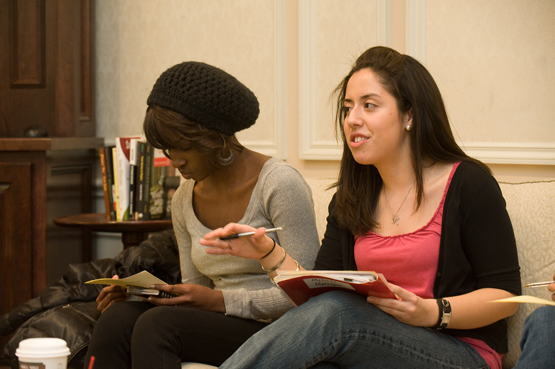To Reach Out, and Answer Questions
Multicultural Weekend offers a glimpse of life at BU for students of color

Dionte Henderson’s first visit to Boston University made him wonder whether he’d ever fit in.
He’d heard rumors of the city’s frigid weather, so he wore a winter coat to his mid-July orientation. An inexperienced traveler, he packed a huge suitcase; other incoming students carried only backpacks. When the freshmen split off into assigned orientation groups, he remembers being the only African-American among his group of College of Engineering students.
 “I was a little put off, a little confused — I thought because I was in a city, I would see much more diversity,” says Henderson (ENG’09) (right). “I didn’t want to go to a school where I’d be the only person of color in the classroom. I was like, oh, no — did I make the wrong choice?”
“I was a little put off, a little confused — I thought because I was in a city, I would see much more diversity,” says Henderson (ENG’09) (right). “I didn’t want to go to a school where I’d be the only person of color in the classroom. I was like, oh, no — did I make the wrong choice?”
Since then, Henderson has found his own comfort zone by getting involved with the Howard Thurman Center, BU’s multicultural center, and he now helps others make the transition to life at BU by hosting prospective students during Multicultural Weekend. The annual open house for admitted minority students, which begins on Thursday, April 16, gives prospective freshmen a chance to talk to BU administrators, learn about student organizations, and meet their classmates. It also forges relationships that prove critical in many students’ decision to attend BU or not: every high school senior is matched with a BU student host for three days of sharing the kind of information that doesn’t come from a panel discussion with professors.
“Every single year, I’m up ’til three or four in the morning talking with the students, going over any questions they may have,” says Henderson, who’s hosted every year. “They can hear from someone they see eye to eye with, and that gives them the comfort and confidence to say, ‘This is the place I want to go.’”
Multicultural Weekend, now in its sixth year, is run by the Admissions Student Diversity Board (ASDB), a division of Admissions that recruits qualified students from four underrepresented minority groups: black and African-American, Hispanic and Latino, Native American, and native Hawaiian or Pacific Islander. Supervised by former ASDB member Bobby Treviño (CAS’05), the senior assistant director of admissions, the board comprises students whose experiences at BU have sparked an interest in helping build a more diverse campus.
Board members say that community, not race, is the biggest concern for prospective students. Melissa Barragan (SED’10), a co-coordinator of ASDB, doesn’t have a lot of students telling her they’re nervous about being the only Latinos on campus; instead, they often ask about her involvement in religious life. John Aguilar (CAS’10), from El Paso, Tex., says that as a freshman, he was less focused on finding other Mexican-Americans and more interested in meeting others new to New England. And despite his experience at summer orientation, Henderson says he feels it’s more important to be a resource for students with similar financial circumstances, not just racial or ethnic backgrounds.
“Because you’re the same race as me doesn’t mean we’re connected,” he says. “I’m more concerned about people within my economic bracket.”
The percentage of self-identified minority students at BU remains low: according to the fall 2008 freshman profile, 3.2 percent of the class of 2012 identified as African-American and 7.4 percent as Hispanic-American, compared to 65.1 percent Caucasian.
On a personal level, however, the members of ASDB feel sure that they’re making a difference. Henderson says all but one of the students he’s hosted have chosen to attend BU; the one that got away opted for Harvard. Barragan says that approximately 70 percent of the students who come to Multicultural Weekend decide to attend BU.
“The one thing they always point to is their host,” says Barragan. “They say, ‘If I hadn’t gotten involved in Multicultural Weekend, my experience at BU would have been completely different.’”
Jessica Ullian can be reached at jullian@bu.edu.
Comments & Discussion
Boston University moderates comments to facilitate an informed, substantive, civil conversation. Abusive, profane, self-promotional, misleading, incoherent or off-topic comments will be rejected. Moderators are staffed during regular business hours (EST) and can only accept comments written in English. Statistics or facts must include a citation or a link to the citation.